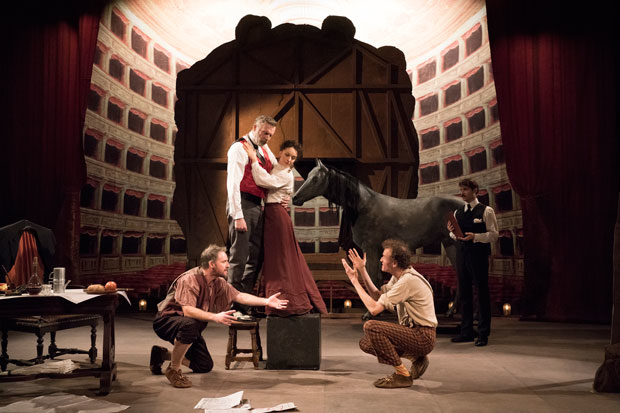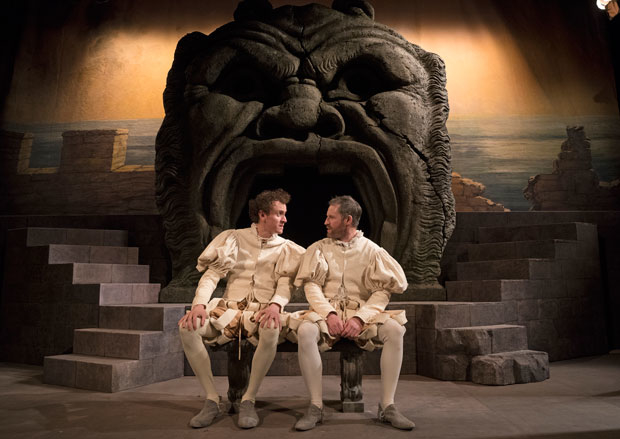A Play Goes Wrong in Imperfect Love
Brandon Cole’s period piece about backstage drama comes to the Connelly Theater.

(© Richard Termine)
It takes a bit of bravery to write a play that deals primarily with the circumstances surrounding a bad play that gets horrible reviews. Doing so runs the risk of inviting comparisons between the play we're watching and the one the play is about. That's a pitfall that Brandon Cole's Imperfect Love falls headlong into. Cole's ambitious but rambling script, however, is just one of the problems troubling this wobbly production, now running at the Connelly Theater.
Cole based Imperfect Love on Italian actor Eleonora Duse and her tempestuous love affair with playwright Gabriele D'Annunzio. Here, Duse becomes Eleonora Della Rosa, or just "Rosa" (played with melodramatic abandon by Cristina Spina), the jealous lover of has-been playwright Gabriele Torrisi (Rodrigo Lopresti in a one-note performance). The year is 1899. Rosa and Gabriele are rehearsing like mad the morning after Gabriele's play bombed at the Teatro Argentina in Rome. Rosa's monologue at the end of Act 1, everyone agrees, is terrible; it's killing the play. If they don't come up with new lines, theater owners Pallone and Asters will shutter the production. So Rosa and Gabriele try to use the frothy overspill from their own angry relationship to come up with fresh language to replace the anemic words that come from Gabriele's uninspired pen.

(© Richard Termine)
Dashing leading man Domenica (played with panache by Aidan Redmond) enters to inform them that Ibsen is the way the theater's going these days and that the Teatro Argentina is going to stage A Doll's House instead of Gabriele's play. Fellow actors Marco and Beppo (a comical pair played by Ed Malone and David O'Hara, respectively) know the play has problems. "Rosa’s final monologue," says Marco, "that’s where your play failed completely, Gabriele. That's where its weakness really showed." But they have faith in Gabriele's play and want it to be performed. So Beppo comes up with a creative plan that arouses Rosa's jealousy and makes her doubt Gabriele's fidelity, thus inspiring the volatile, passionate language that her monologue so desperately needs. But will Beppo's plan work?
By the time that question is answered, it hardly seems to matter anymore, since over the course of two hours (including a 20-minute intermission for an impressive but impractical set change designed by Gianni Quaranta), director Michael Di Jiacomo fails to raise the emotional stakes between Rosa and Gabriele one iota. While Spina emotes to the rafters, Lopresti remains emotionally adrift, unsure how to tap the passion we presume his Italian playwright must be harboring inside. Part of the blame also lies in the melodramatic, repetitive, cliché-laden dialogue: "Look around you!" says Rosa to Gabriele late in Act 2. "It's nothing here but chaos and arguments and my lines are still bad!" At this point in the play, Rosa's words are more on the nose than she realizes.
Thankfully, there are some bright spots. Malone and O'Hara prove somewhat effective clowns doing a shtick vaguely reminiscent of the tramps in Waiting for Godot, and the play-within-a-play structure has an intellectually appealing metadramatic quality (Cole dedicated his play to Samuel Beckett and Luigi Pirandello). Redmond also cuts a fine figure in Quaranta's period-inspired costumes and shows his comic timing in a humorous bit he performs with an orange. But these moments are not enough to offset Imperfect Love's imperfections, which include more than just a bad monologue.







